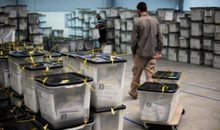
 Flash News
Flash News
Lied to FBI about Charles McGonigal's connections, Former Diplomat Pleads Guilty
40-year-old arrested for stealing hospital employees' bags
International Atomic Energy Agency: Iran's main nuclear plants not hit
AMP punishes three "Eagles" officers, suspends them from duty
They ordered the removal of KLA flags in the match with Serbia, protest in front of the AFF
US limits non-essential staff at embassy in Iraq after rising tensions with Iran
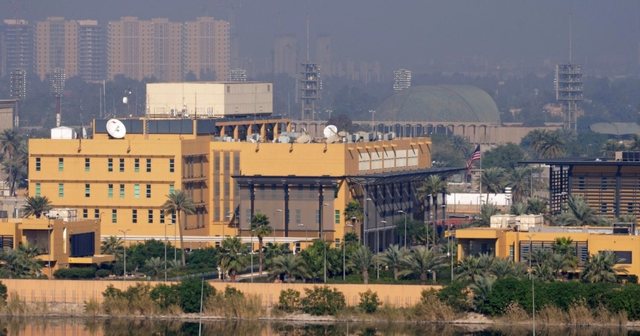
The United States is reducing the number of non-essential staff in the Middle East, the State Department announced Wednesday evening. The U.S. Embassy in Baghdad is preparing for an emergency evacuation due to heightened security risks in the region.
The United States is also authorizing the departure of non-essential personnel and their family members from Bahrain and Kuwait, giving them the option to choose whether they want to leave.
An Iraqi Foreign Ministry official confirmed the "limited departure" of US Embassy staff, saying the decision was based on "potential security concerns related to regional tensions."
Tensions in the region are rising as nuclear talks between the United States and Iran appear to have stalled, and as the 18-month war in Gaza has raised fears of a wider regional war.
The talks aim to limit Iran's nuclear program in exchange for the lifting of some of the economic sanctions the US has imposed on Iran, which insists its nuclear program is for peaceful purposes.
Iran has said the next round of talks with the US will be held on June 15 in Oman. Iran is preparing a counterproposal after rejecting a US proposal for a deal that Supreme Leader Ayatollah Ali Khamenei described as "100 percent against national interests."
US special envoy Steve Witkoff will meet with Iranian Foreign Minister Abbas Araqchi in Muscat to discuss Iran's response, according to US media reports citing a US official.
The United States has a military presence in Iraq, Kuwait, Bahrain, Qatar, and the United Arab Emirates.
A US official said there has been no change in the status of al-Udeid Air Base in Qatar - the largest US military base in the Middle East - and that no orders have been issued to evacuate employees or family members of the US Embassy in Qatar, Reuters reported.
President Donald Trump said people are "leaving" the "dangerous" Middle East, when asked about news that non-essential personnel have been given the opportunity to leave.
"We'll see what happens," Trump said.
"They can't have nuclear weapons," Trump stressed, referring to Iran and the nuclear talks.
In an interview published on June 11, Trump said his confidence that Iran would accept a deal on its nuclear program was much lower than it was a few months ago.
Speaking on a New York Post podcast published on June 11, Trump said he "don't know" whether he will be able to convince Tehran to stop its nuclear activities.
"I don't know. I used to think so, but now I'm less and less sure about it," the US president said.
"They seem to be delaying, and I think it's unfortunate. I'm less sure now than I was a few months ago. Something has happened to them," he said in the interview recorded on June 9.
Trump has not ruled out military action against Iran's nuclear facilities if diplomacy fails, while US intelligence suggests that Israel is preparing to attack Iran if talks fail.
Iran's Defense Minister, Aziz Nasirzadeh, said on June 11 that if nuclear talks fail and a conflict breaks out with Washington, Tehran will retaliate by striking American bases in the region.
Iran's mission to the UN posted a statement on the X platform saying that threats of force "will not change the reality: Iran does not seek nuclear weapons and US militarism only fuels instability."/ REL
Latest news




Bennett who sealed the political "deflowering" of SPAK
2025-06-13 12:21:27
Lied to FBI about Charles McGonigal's connections, Former Diplomat Pleads Guilty
2025-06-13 12:10:56

The strange world of justice
2025-06-13 11:55:10
SPAK reports today to the GJKKO the two-month investigation into Erion Veliaj
2025-06-13 11:39:30

40-year-old arrested for stealing hospital employees' bags
2025-06-13 11:21:09


Tabaku: We cannot behave like Europeans in Brussels and like autocrats in Tirana
2025-06-13 10:49:00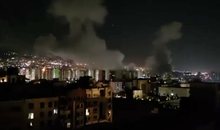
International Atomic Energy Agency: Iran's main nuclear plants not hit
2025-06-13 10:36:12
AMP punishes three "Eagles" officers, suspends them from duty
2025-06-13 10:28:13
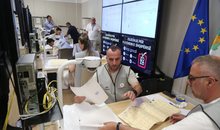
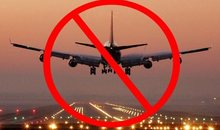
Flights in the Middle East canceled after Israeli airstrikes on Iran
2025-06-13 09:53:02
Halit Valteri appears in SPAK, why was he summoned?
2025-06-13 09:39:50


These Horoscope Signs Will Have Lots of Luck During the Summer
2025-06-13 09:13:00



What are Iran's nuclear ambitions and why are they so controversial?
2025-06-13 08:38:03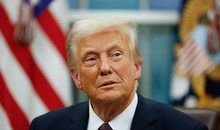
Donald Trump convenes cabinet after Israeli attacks on Iran
2025-06-13 08:24:44
Foreign exchange, the rate at which foreign currencies are sold and bought
2025-06-13 08:16:58
Albanian investments abroad slowed down in the first quarter of the year
2025-06-13 08:06:34
Çfarë ndodh në organizëm nëse hani një thelpi hudhër në darkë
2025-06-13 08:00:48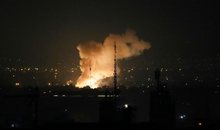
Israel attacks Iran, targets nuclear plants and military commanders
2025-06-13 07:46:14
Temperatures up to 36 degrees, as the weather forecast for today
2025-06-13 07:33:10
Horoscope June 13, 2025, what the stars predict
2025-06-13 07:15:37
Morning Post/ In 2 lines: What mattered yesterday in Albania
2025-06-13 06:59:27
Car goes off the road on the "Tirana-Lezha" axis, 4 injured
2025-06-12 23:03:47

Document/ Benet Beci was taken into custody by SPAK before the elections
2025-06-12 22:52:12






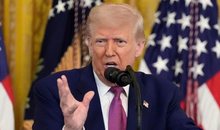

Montenegrin Army to train Ukrainian soldiers
2025-06-12 20:13:45
Italia në alarm, zgjebja po përhapet me shpejtësi
2025-06-12 20:11:39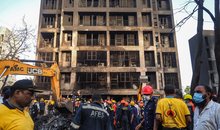

Dua Lipa gets engaged: I'm happier than ever with Callum Turner
2025-06-12 19:44:29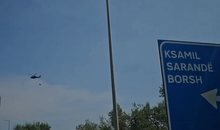

Around 29,000 Albanians left last year, INSTAT estimates
2025-06-12 19:31:23

Rama "sacrifices" the socialists to make fun of Soros
2025-06-12 19:13:33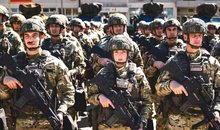
Montenegrin Army to participate in EU military assistance mission to Ukraine
2025-06-12 18:57:36



Body acne, six ways to prevent it
2025-06-12 18:05:03

State Matura 2025, foreign language exam grades published
2025-06-12 17:31:26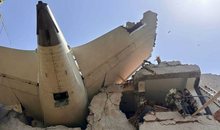
Video/ This is the moment the Air India plane crashes with 242 people on board
2025-06-12 17:27:59
GJKKO postpones the hearing for 'Golden Bullet' to June 17
2025-06-12 17:23:50
The decline of democracy in Albania, the alarm from the European Parliament
2025-06-12 17:03:38

What does the murder of Superman Veliaj reveal about May 11?
2025-06-12 16:40:53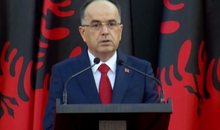


UN report: Europe is surrounded by a belt of countries in crisis
2025-06-12 16:08:47
Sula: The scandal with the state matura, a failure of the education system
2025-06-12 16:08:42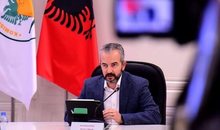

'I have no affection', Erion Isai separates from his wife
2025-06-12 15:40:38


On the 84th anniversary, the SP is ever bigger, Albania is ever smaller
2025-06-12 15:07:25
A "lazy day" a week can reduce stress and stroke risk
2025-06-12 14:56:30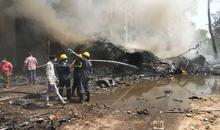

Tragic in Fier, 28-year-old found dead in the yard of his apartment
2025-06-12 14:39:15
How does temperature affect body composition?
2025-06-12 14:33:18
Throwing company waste into the Buna River, 31-year-old employee prosecuted
2025-06-12 14:30:11

LDK's Abdixhiku unveils 15-point agenda for a unity government
2025-06-12 14:14:24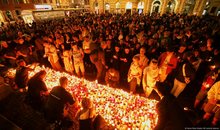
From shootings to stabbings/The history of deadly school attacks
2025-06-12 14:11:51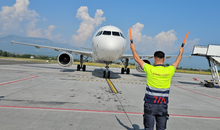
3 Albanians, part of criminal organizations, extradited to Italy
2025-06-12 13:59:15
A 26-year-old man is arrested for the armed conflict in Ali Dem
2025-06-12 13:40:31
Report/ Albania worsens in gender equality index
2025-06-12 13:40:14

Quarrel between neighbors in Patos, 35-year-old injured with screwdriver
2025-06-12 13:07:05

Accident on the Krahes-Memaliaj axis, a 65-year-old man is injured
2025-06-12 12:45:49


Demand a recount of votes in Tirana, the Court dismisses Alimehmet's case
2025-06-12 12:22:08
Suffering cardiac arrest, vacationer dies on Qerret beach
2025-06-12 12:05:48

The market is "demanding" a minimum wage increase
2025-06-12 11:52:37

Alarm on the coast/ Elderly woman from Kosovo risks drowning!
2025-06-12 11:25:51
The hearing for "Golden Bullet" is postponed due to the lack of lawyers.
2025-06-12 11:06:27
The Special Court schedules the hearing for the “Partizani” case
2025-06-12 11:00:42
